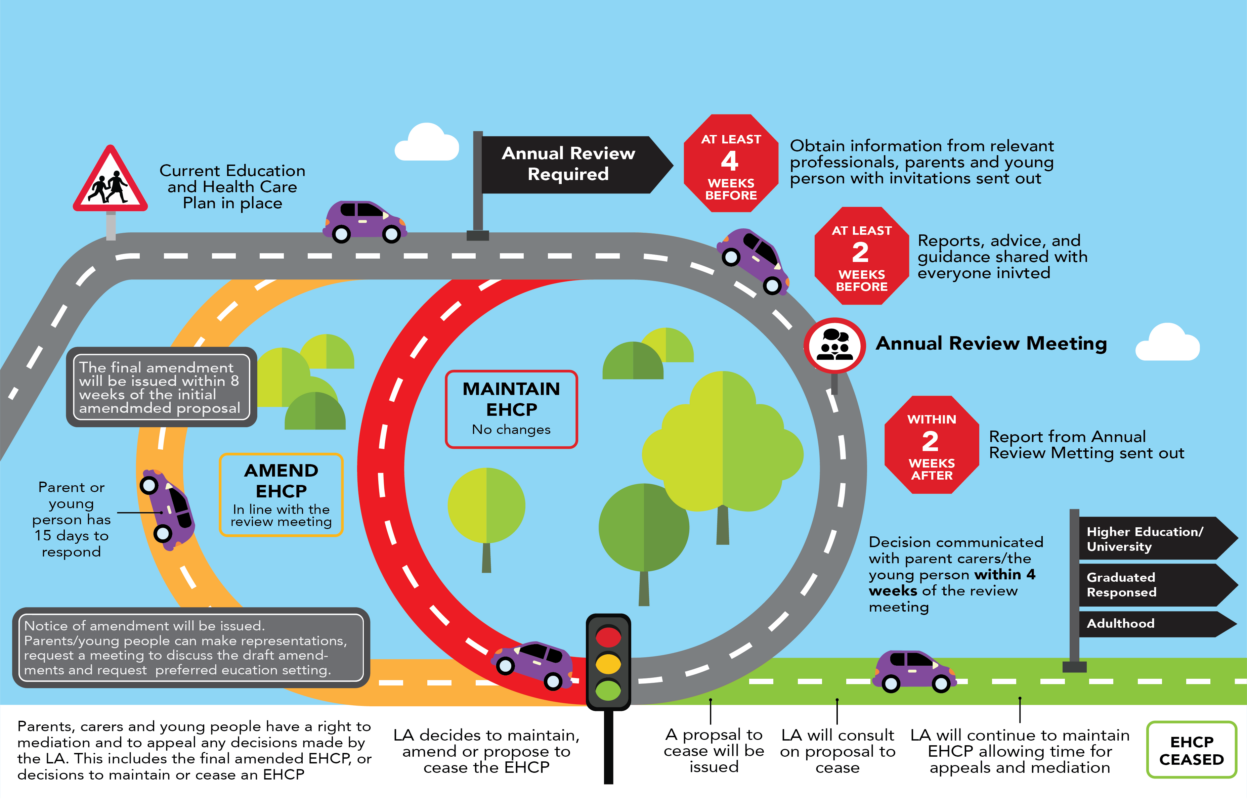All children are regularly assessed in their education setting, however, children with special educational needs or disabilities require closer monitoring and regular EHCP reviews to ensure they are progressing according to their age, ability and aptitude.
All EHCPs should be reviewed at least termly to help check that your child is progressing towards the agreed outcomes.
An EHCP must be reviewed in full, with relevant SEND support services, at least once every twelve months. This is usually called an annual review.
Meetings and reviews should be positively focused to explore a better and more positive future for the child or young person. The positive approach for meetings and reviews should focus less on what’s wrong, and more on what we would like to happen.
Reviews may be requested by educational staff, parents/ carers or young people (16 years or over) at any time to reflect changing circumstances, e.g. a change in special educational needs or health.
An EHCP must be reviewed in full, with relevant SEND support services, at least once every twelve months. This is usually called an annual review. However, it is not expected that EHCPs will need to be amended every year.
Reviews for pupils with an EHCP changing schools must be completed before specific points in the calendar year when they move from:
- primary to secondary school (year 6 to year 7); or
- Secondary to post-16 education (year 11 to year 12); or
- Between post-16 providers
The local authority must confirm to parents of pupils in year 6, the name of the school or type of school their child will attend in year 7 by 15th February in the year of transfer. This must be recorded in section I of the EHCP.
For pupils in year 11 or young people changing providers in post-16 education, the date is 31st March in the year of transfer. This must be recorded in section I of the EHCP.
To provide time for consideration of different schools/types of schools, parents may wish to start the discussion about the next phase of education for their child at the year 5 review.
Similarly, parents of year 10 pupils may wish to start to consider the move to post-16 education at the year 10 review.
Your views (and those of your child) are an important part of the review meetings.
If you need more support please reach out to your assigned SENAR case worker. Details of who your dedicated case worker is can be found here: SENAR – Local Offer Birmingham

What is an Annual Review
If your child has an Education, Health and Care Plan (EHCP) the Local Authority must review that plan at least every year.
This means that a review of the progress the child or young person is making towards the objectives in the EHCP must take place at least every 12 months. EHCPs can be reviewed more frequently where needed.
If a place at a special school or a resource base attached to a mainstream school is recommended, the pupil’s papers will have to go to a decision-making group (local authority panel) for consideration.
Before the Annual Review
At the start of the Annual Review Process, your child’s school; educational setting; or the local authority, will invite you to the review meeting alongside various professionals outlined in section 20 and section 21 of the SEND Legislation. These are:
- the child’s parent or the young person
- the provider of the relevant early years education or the head teacher or principal of the school, post-16 or other institution attended by the child or young person (if your child attends school or another education setting);
- an officer of the authority who exercises the local authority’s education functions in relation to children and young people with special educational needs
- a health care professional identified by the responsible commissioning body to provide advice about health care provision to the child or young person
- an officer of the authority who exercises the local authority’s social services functions in relation to children and young people with special educational needs
- any other person whose attendance the local authority considers appropriate
The person organising the meeting will obtain written advice about your child’s progress and the appropriateness of the EHCP from you and the professionals listed previously.
Professionals, parents and young people will be given two weeks in which to respond to the request for information.
Everyone will be given at least two weeks’ notice of the meeting date. Everyone will be provided with copies of the written advice with the notice of the meeting date.
At least two weeks before the review meeting, the school or setting will circulate any written evidence and invite comments. Your views are very important.
When providing your written advice and reading the advice from others involved in the annual review, you may want to think about the topics you covered when you originally provided parental advice for your child’s education, health and care assessment and checked your child’s EHCP.
The Review Meeting
It may be that the review meeting will only involve you, teachers from your child’s school or educational setting, and possibly someone from the local authority.
Other professionals do not usually attend a routine annual review meeting. They may attend to discuss specific needs, or if the annual review meeting is to discuss your child’s transition.
If you consider there is a reason for a particular professional to attend, you may wish to raise this with the person organising the meeting when you are asked for your comments before the meeting date.
You can take a friend or relative to support you.
Your child may also attend all or part of the review meeting as appropriate. The older they are, the more likely they will be involved.
The review meeting should consider if your child’s EHCP is still appropriate, if there are any amendments to be made to the EHCP and if the local authority should continue to maintain the EHCP.
The meeting should look at the progress made to the previous targets and provide a new set of targets for your child for the coming year. These should meet the outcomes set out in the EHCP.
After the Review Meeting
No later than two weeks after the review meeting, the school or setting must prepare and submit a report to the local authority.
If your child or young person does not attend a school or educational setting, the report will be prepared by the local authority.
The report will summarise the meeting’s conclusions and include recommendations, with reasons, as to whether the EHCP should be amended or maintained. The school, setting or local authority will send a copy of the report to you and any professionals involved with the review process.
The local authority will decide whether to make any changes to your child’s EHCP.
They can decide to:
- amend (change) the Education, Health and Care Plan,
- leave the Education, Health and Care Plan unchanged,
- cease to maintain (or end) the Education, Health and Care Plan.
Within four weeks of the review meeting, the local authority will write to you to confirm its decision.
If the local authority has decided to leave the EHCP unchanged or to cease to maintain the EHCP, the letter will also inform you of the next steps you can take to challenge the decision and sources of further information.
If the local authority decides to amend the EHCP, officers will write to you and enclose a copy of a draft EHCP containing the amendments the LA proposes to make. This draft EHCP will not contain the name of a school.
You will be given fifteen days in which to make comments, propose the name of the school you would like your child/ young person to attend and request a meeting to discuss the proposed amendments if that would be helpful to you.
The local authority will consider your comments and will make a final decision about the amendments it will make to the EHCP. The local authority is not obliged to include all your comments.
Within eight weeks of sending the draft EHCP to you, the local authority will send a final amended EHCP to you with a covering letter.
If you remain unhappy with the changes, the letter will refer you to SENDIASS for further advice and explain to you how you can challenge the decision (amendments) either via mediation or by appeal to the SEND Tribunal.
Tips for Parents/Carers Attending an Annual Review Meeting
Before the school meeting/review – be prepared!
Do I know:
- Where the meeting is? (Route, parking etc)
- The time? (When? How long will it last?)
- Who will be there? why it is happening?
- What I want to achieve?
- What outcomes might others want?
- How am I feeling – how might I behave?
- How are others feeling – how might they behave?
- Have I written down all the questions I want to ask?
- Have I got all the information and paperwork I need?
- Will someone be taking notes? (Possibly a partner or friend)
- do I want someone to go with me? (A partner, friend etc)
- have I got the views of my child or will my child be there?
After the Meeting:
- Have I understood everything that was said? (It may be helpful to confirm this by email or letter with the school or setting),
- Am I happy with the way things have gone?
- Do I feel that agreements have been reached that we can all stick to?
- Does everyone know what they are doing next?
- What am I doing next?
- Is someone co–ordinating action?
- Will I get notes or minutes of the meeting?
- If it is an Annual Review meeting, will I see the Annual Review form before it is sent to the Local Authority?
- When are we going to review progress?


